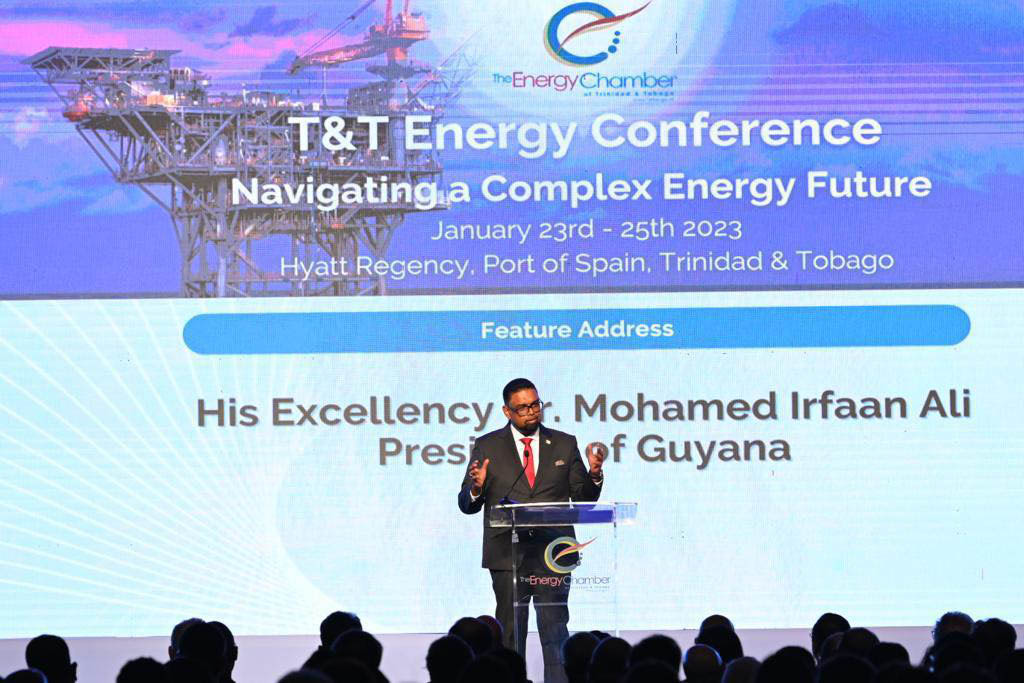Guyana is in talks with Qatar, Britain, the United Arab Emirates and India on the possibility of directly allocating offshore blocks for oil and gas exploration in parallel with a bidding round this year, President Irfaan Ali said on Monday in Trinidad, according to Reuters.
Ali had previously said here that some blocks would be set aside for bilateral deals but Monday was the first time he was explicit about which countries could be in the arrangement.
Ali had interestingly first mentioned bilateral arrangements on October 19, 2022 on the occasion of the formal announcement that the United Kingdom was lifting the visa requirement for Guyanese.
Reuters yesterday noted that Guyana will receive bids through mid-April from energy firms for its competitive bidding round, which is offering 14 areas encompassing shallow and deepwater areas. Separately, it has held talks with other nations over directly allocating areas.
“We have been toying with a number of options,” Ali said on the sidelines of an energy conference in Trinidad and Tobago on Monday. “We have gone out publicly with the bid round (and) there is also that room we are looking at for government-to-government collaboration.”
Reuters noted that Ali visited India earlier this month, where he encouraged companies to participate in the round and engaged in talks with the government for block allocations to state companies and on possible oil supply contracts to the Asian country.
India has been pressing for access to Guyana’s oil and it had been suggested that New Delhi might also be interested in sewing up one of the offshore blocks.
When former British Prime Minister Boris Johnson met Ali last year, they discussed energy investment opportunities, President Ali said on Monday.
“In the environment we are operating, you have to keep as many cards on the table,” Ali added, according to Reuters.
Trinidad and Tobago’s Prime Minister Keith Rowley also said at the conference on Monday that his government will consider direct negotiations with energy firms for oil and gas exploration, possibly moving away from a competitive bidding round system.
According to Reuters, a note of caution was sounded by one analyst in relation to the Guyana plans for bilateral deals.
“It’s unclear if the government-to-government negotiations are related to the already announced 14 exploration blocks or if they are talking about different areas,” said Andre Fagundes, vice president of Research at Welligence Energy Analytics.
Clearly communicate
“It’s important for Guyana to clearly communicate what these government-to-government negotiations really mean, and when they will take place. Otherwise, they can seriously hurt the bid round transparency and alienate potential participating companies, especially the non national oil companies,” he added.
Trinidad’s Energy Minister Stuart Young proposed at the conference an energy alliance to bring oil and gas resources from Guyana, Venezuela and Suriname to Trinidad, which currently has spare processing and export capacity.
The COVID-19 pandemic and the war in Ukraine show the region has to stand on its own, Young said. Combining resources from new discoveries in Guyana and Suriname with Trinidad’s capacity provides an opportunity for the region to play a greater role in global energy supplies, he added, according to Reuters.
Ali also called for the Caribbean to work together and said some countries are pushing renewable energy agendas without understanding the impact on producers like Guyana, Reuters said.
The Guyana Government on December 9th last year launched the licensing round for 14 offshore oil blocks.
“We have a situation where there is a timeframe on oil and gas development. We understand the direction in which the world is going, so it is very important for us to have developers who are serious, who will expeditiously move towards developments of the oil and gas resources,” Ali said in an announcement broadcast on his Facebook page yesterday morning.
He added that April 14, 2023 has been set as the deadline for the close of submission for bids and contracts are expected to be awarded by the end of May, 2023, following evaluation of bids and negotiations.
The blocks being offered in what is the country’s first licensing round are located in shallow and deepwater areas offshore, which are estimated to hold potential resources in excess of 25 billion barrels of oil equivalent (boe) and an estimated reserve in excess of 11 billion boe.
One of the key features of this competitive round, Ali said, is to ensure the “best possible outcome” under new terms and conditions. “What we are seeking to do is to have the best possible outcome for Guyana…This bidding round is being launched taking into consideration the lessons learnt, the experiences and the new terms and condition,” he said, in reference to the country’s lopsided agreement with ExxonMobil and its partners for its holdings in the offshore Stabroek Block area.
Ali reminded that there are improved fiscal terms that provide a greater balance of the share of revenue between the government and contractor, while maintaining Guyana’s competitive edge in the region and globally.
“…We understand that the cost for capital for oil and gas exploration and development is going up also and we also understand the access to capital has become quite more cumbersome,” Ali said. “So we have to ensure that there is a balance in what we do,” he said.
On October 19 last year, Ali had said that the government has decided that not all of the country’s oil blocks will be auctioned as some will be left for bilateral agreements with nations this country will negotiate with in the future.
“I think very soon we are going to move to the auctioning of some blocks, and we have some blocks that are set aside for what is termed government-to-government partnership and we are looking at all our strategic partners for these blocks,” the President said during a press conference when the United Kingdom announced that it was waiving visas for leisure and business travel for Guyanese.





